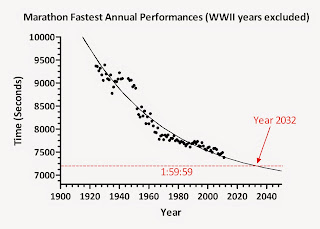The two-hour marathon: Can it happen? The debate heated up with Dennis Kimetto's time of 2:02:57 in the fall of 2014. As I recall, he was less than a kilometer from the finish when he crossed the two-hour mark. But even before Kimetto's run, Alex Hutchinson had already assembled a discussion on what it would take to run a sub 2-hour marathon.
I have been watching these debates mainly from the sidelines as I hadn't found the data convincing enough either way. The only truly convincing (though most difficult) demonstration would be to run a 1:59:59 marathon. The easiest -and most problematic- line of reasoning is to plot marathon record time vs date achieved and extrapolate to one's peril:
 |
| Image from SweatScience's post 2032: Year of the Sub-2:00 Marathon? |